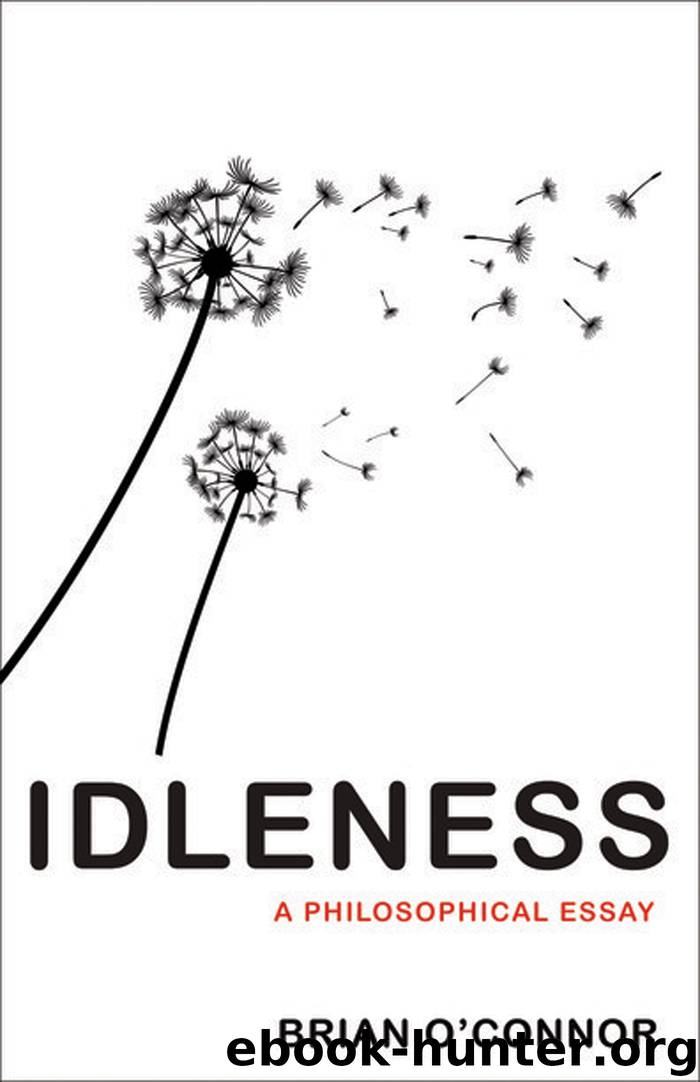Idleness by Brian O'Connor

Author:Brian O'Connor [O'Connor, Brian]
Language: eng
Format: epub
ISBN: 9780691167527
Publisher: Princeton University Press
Published: 2018-01-15T07:00:00+00:00
SCHOPENHAUER ON THE IMPOSSIBILITY OF REST
For Schopenhauer, boredom is not symptomatic of misdirected activity. It is therefore not to be perceived as an opportunity for growth in self-knowledge. Boredom is, rather, the immediate experience of the miserable emptiness of existence. Its sheer awfulness drives us to activity, but not, whatever we might usually believe, in order to make meaningful lives for ourselves. Rather, we act simply to escape from boredom. This general idea motivates Schopenhauer’s complex account of human action, which, among other things, offers to explain—as a supposed fact of nature—why human beings cannot endure idleness. Idleness in his view necessarily creates boredom. The worry about idleness as a gateway to boredom is not, obviously enough, exclusive to Schopenhauer. His efforts to defend this association, however, are unique in their depth, encompassing a theory of human psychology and an account of how we human beings are placed within the universe.
As we explore the elements of Schopenhauer’s theory, we shall begin to see that its force owes much to a preferred notion of human character. He is committed to subsuming all the human activity that he observes under homo volens: we are essentially creatures who simply want. As a consequence of this model, we can, he insists, enjoy states of idleness only momentarily, if at all, since wanting is our most powerful and prevailing motivation. The implausibility of this view is effectively conceded by Schopenhauer himself when he discusses certain forms of experience that are precisely a withdrawal from restless wanting. Of significance too, in assessing Schopenhauer’s view about the connection between idleness and boredom, is his ahistorical perspective. Schopenhauer does not consider whether there are specific historical conditions that make that connection more likely. No question is raised about a possible relation between the presence of certain social values and the “fact” that we are by nature restless. Again, though, in other contexts—primarily in his discussion of Cynicism—he implicitly realizes that there are ways of life that successfully detach themselves from the overbearing norms of success and, consequently, from the urge to work and to gain standing in the world. His philosophy might be seen, in this respect, to have an answer to the very problem it appears to bind itself to, namely, whether human beings can free themselves from the social—not natural—pressures to be industrious, productive, and visible.
Schopenhauer holds that life’s fundamental state is that of suffering. This claim sits alongside his apparently related view that life is essentially empty. Suffering is attributed neither to individual misfortune and choices nor to historical forces. The cause of the manner in which we human beings suffer is our own intrinsic nature. Our psychological dispositions are structured in such a way that suffering is an ineradicable likelihood. We constantly and uncontrollably, he insists, put ourselves in the way of disappointment. The set of unhappy human experiences is not necessarily greater than the happy one, but it is to be understood as normal rather than aberrant. This means, Schopenhauer believes, that we should consider suffering to be our given condition.
Download
This site does not store any files on its server. We only index and link to content provided by other sites. Please contact the content providers to delete copyright contents if any and email us, we'll remove relevant links or contents immediately.
The remains of the day by Kazuo Ishiguro(8965)
Tools of Titans by Timothy Ferriss(8360)
Giovanni's Room by James Baldwin(7315)
The Black Swan by Nassim Nicholas Taleb(7097)
Inner Engineering: A Yogi's Guide to Joy by Sadhguru(6783)
The Way of Zen by Alan W. Watts(6590)
Asking the Right Questions: A Guide to Critical Thinking by M. Neil Browne & Stuart M. Keeley(5751)
The Power of Now: A Guide to Spiritual Enlightenment by Eckhart Tolle(5742)
The Six Wives Of Henry VIII (WOMEN IN HISTORY) by Fraser Antonia(5493)
Astrophysics for People in a Hurry by Neil DeGrasse Tyson(5172)
Housekeeping by Marilynne Robinson(4433)
12 Rules for Life by Jordan B. Peterson(4298)
Double Down (Diary of a Wimpy Kid Book 11) by Jeff Kinney(4257)
The Ethical Slut by Janet W. Hardy(4236)
Skin in the Game by Nassim Nicholas Taleb(4232)
Ikigai by Héctor García & Francesc Miralles(4229)
The Art of Happiness by The Dalai Lama(4120)
Skin in the Game: Hidden Asymmetries in Daily Life by Nassim Nicholas Taleb(3986)
Walking by Henry David Thoreau(3949)
